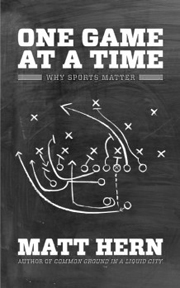 A World in Which Many Worlds Collide
A World in Which Many Worlds Collide
One Game at a Time: Why Sports Matter
AK Press, 2014
by Matt Hern
Reviewed by Joshua Stephens
What with the ongoing, growing challenges to the Washington NFL team’s racist name and iconography, alongside scandals around everything from epidemic traumatic brain injuries within the sport, to the exploitation of college athletes and professional cheerleaders, to domestic violence – all making headlines in the mainstream press and commanding the attention and introspection of a popular audience, it’s perhaps more difficult now than it ever has been to extricate sports from politics. All of this unfolding on the heels of yet another tumultuous World Cup event shining a light on global poverty, and the organization of life in the neoliberal era.
“I think we need to talk about transformative possibility and the body, and particularly the idea of collisions,” Matt Hern argues in his most recent work, One Game at a Time. While half the work serves as an attempt to redeem sports as a politically relevant facet of life, even for spectators, it’s the shakier part of Hern’s project. Where he takes us deeper, however, his argument shines. “To talk about collisions is to talk about risk. Without risk, our lives become intolerable, safety-first regimes: hermetically-sealed, sanitized dystopias where nothing ever happens.” What he’s getting at, here, in the most direct sense, is precisely what many old enough to have organized in the Seattle-era alter-globalization movement discovered in Lower Manhattan in late 2011, as the Occupy movement was born: the non-negotiable fact of contingency; that the world owes our expectations nothing, and effective political organizing is as much (if not more) a matter of our skill and dexterity in meeting conditions –and people-- over which we have no control as it is our command of the “correct” analysis.
In his work The Political Philosophy of Poststructuralist Anarchism, Todd May attempts to rearticulate anarchism through precisely this consideration – the distinction between strategic politics, which overcode and reduce lived experience to abstract categories (as, he agues, the Marxist tradition has historically), and tactical politics. The latter orientation begins from the singularity and irreducibility of experience, and takes on domination as such, regardless of whether it corresponds with pre-existing or established forms or grand narratives. It’s likely little coincidence, then, that Hern gets deep with late French theorist Jean-Luc Nancy (whose thought May explores in his work Reconsidering Difference). For Hern, sports bring us face to face with the fact that we exist only and fundamentally in relation. “The physical world is constantly infiltrating us and us it. And so are other people,“ he observes, before taking a beautifully ecological turn: “I breathe the air you exhale. I drink water that has been through countless people’s systems. We share bacteria every day... Our bodies are endlessly, physically permeable: in a very real sense, your health is my health.”
On the surface, there’s nothing terribly earth-shattering, here – and Hern admits as much, owning that he could be dismissed as trading in hippie pab lum. But he points us in a direction that strikes at the core of political work. “To understand the singularity of bodies is to understand and nuance our limits and thresholds, and the possibility of community - of solidarity with others - requires a visceral encounter with those thresholds,” Hern insists. “Not in a ‘this is mine, that is yours’ sense: as Jean-Luc Nancy suggests, your existence is a necessary condition of my freedom.”
What is of crucial significance, here, is what existence denotes. We engage in a deep act of condescension - and indulge a bankrupt vision of liberation - when we say (even implicitly) “my freedom is dependent upon your still having a pulse.” The only politically meaningful definition, here, is one’s existence as a fully realized, complicated, vulnerable, passionate human. And if that very blossoming (what we can effectively call self-determination) in the lives others is a necessary condition of our respective freedom(s), then the struggles against white-supremacy, hetero-patriarchy, and capitalism to which Hern devotes much of the book are not merely stories confined to “fixing” sports. Rather, sports constitute an encounter in which we collide and experience each other’s vitality and fragility simultaneously, with real stakes – with outcomes riding on how we respond to the singular, unpredictable present moment. What he’s arguing for is effectively a shift from doing politics behind the eyes, and doing it in the body.
“In the residue of pain there is an inscription of vulnerability, and possibly tenderness,” Hern tells us. “There’s a very particular feeling, a closeness that sports can engender... We all know the sweetness of these feelings because they are so damn hard to come by elsewhere.” What’s at issue, here, is what often throws us off in the throes of organizing: The world’s indifference to our plans and expectations, and what we feel at those limits (and more importantly, our sense of isolation in not-knowing). Sports matter politically because they constitute an experiment or training in letting go of what we think we know, and waging fierce and (most importantly) responsive fights without recourse to that knowing.



